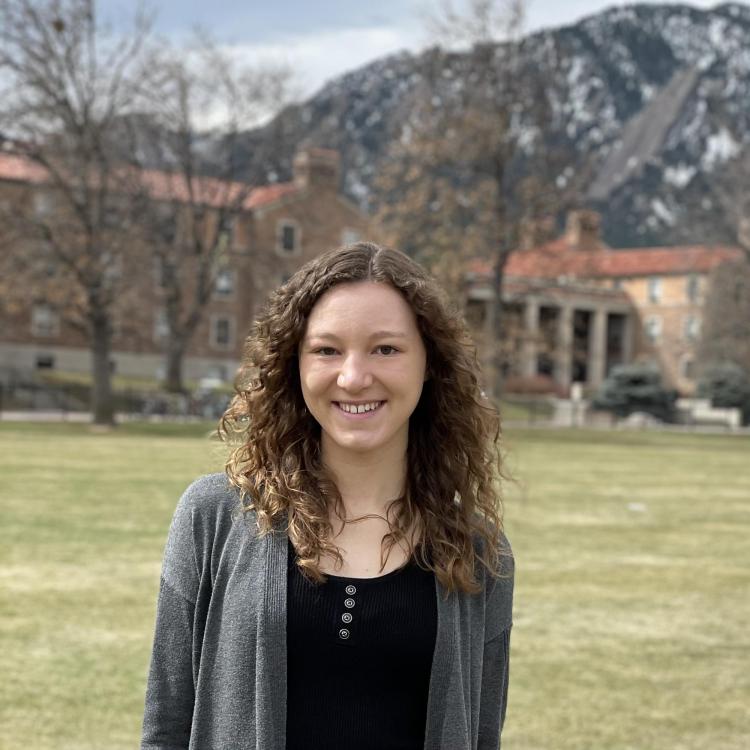Emily Zuetell - Global Engagement Award & Outstanding Undergraduate of the College

The global engagement award recognizes students who are globally engaged in areas such as research, service, professional work, study abroad, Engineers Without Borders and global engineering. Recipients demonstrate an enhanced global understanding and appreciation for working across cultures.
The Outstanding Undergraudate of the College award recognizes one undergraduate student who has maximized their educational experience in a holistic way.
Below, Zuetell describes her experience at CU Boulder.
What is your favorite memory from your time at CU Boulder?
My favorite, most meaningful memory from my time at CU Boulder was attending the ITLL engineering projects expo after being a teaching assistant for the freshman projects course, because it represented the full circle of my engineering experience at CU. My grandfather took me to the ITLL projects expo when I was 8 years old, and seeing the passionate students and the fascinating projects they built, I was inspired to become an engineer. Ten years later, that became a reality as a freshman at CU, discovering my passion and capability for designing devices to improve people’s lives.
At the expo, I showed off a mess of wires and an arduino that could alert people who were hard-of-hearing with tactile, directional feedback. As a junior, after being a teaching assistant for the course and working with freshman engineering students to become confident in their skills to engineer solutions to the problems they experienced in the world, I was struck by the incredible impact that engineers have sharing their work with the world. That memory drives my desire to become a professor so I can impact many students to engineer a better world.
What accomplishment are you most proud of, either academically or personally?
The accomplishment that I am most proud of is receiving the NSF Graduate Research Fellowship. This fellowship was the culmination of a rigorous application process and years of research experience as an undergraduate, demonstrating that I had learned how to ask critical research questions about the world and pursue rigorous solutions. The fellowship also now gives me the freedom to pursue unique, critical research questions throughout graduate school at the intersections of renewable energy system design, data science and policy development to combat climate change.
Throughout my time at CU Boulder, I am grateful to have worked in the Advanced Medical Technologies Laboratory researching bioinspired microtextures to improve medical devices and to have been supported by spectacular researchers and mentors. I’m also grateful for the opportunity to conduct research at the National Renewable Energy Laboratory modeling the reliability of wind turbines and learning about the future of renewable energy research.
What is your plan for after graduation?
After graduation, I will be pursuing a PhD in Engineering and Public Policy at Carnegie Mellon University with the Electricity Growth and Use in Developing Economies (e-GUIDE) initiative researching sustainable energy system design and deployment in developing communities.
Tell us about a moment (or moments) when you felt like you hit your stride or felt like you were “officially” an engineer.
I chose to study engineering because engineers solve problems, so the moment I felt like an “official” engineer was when I realized I had the tools to solve meaningful problems. For me, that moment came in rural Nepal the summer after my freshman year. My team was responsible for constructing a water distribution system in the community with Engineers Without Borders. When we arrived, we realized that our flow data was incorrect and the system we had come prepared to build would not work. Sitting on the wooden floor of our homestay with headlamps on and the monsoon rains pouring outside, calculating the proper fluid dynamics for the system by hand with the support of our professional engineering mentor, I felt like I was solving problems, like a true engineer. The problem was relatively small, but our edited system worked, and the community had reliable access to water to improve sanitation and health outcomes. I realized that being an engineer meant that I had the capacity to learn critical skills on the fly and apply them to solve important problems.
What was the biggest challenge for you during your engineering education? What did you learn from it?
The biggest challenge during my engineering education for me, and I expect most of my classmates, was navigating the final 3/8 of it in the midst of the coronavirus pandemic. In a matter of hours, I lost the support structures, people and routines that I had counted on through my undergraduate education. After many bumps in the road, I learned how important it is to be able to readjust priorities and maintain relationships. These lessons helped me continue to learn and grow with the support of my fantastic, resilient professors, seek support from friends and classmates virtually, and build really amazing projects with teammates I rarely met in person.
What is your biggest piece of advice for incoming engineering students?
My advice to incoming engineering students includes the lessons that carried me through my last four years at CU Boulder.
1) Remember why you became an engineer and identify a cause or problem that you are passionate about.
2) Take advantage of the incredible opportunities CU has to offer. There are so many unique experiences to challenge yourself, meet new, passionate, driven people, and learn skills beyond the classroom.
And 3) Through all the challenging, technical classes and hours of homework, maintain the joy of always learning something new and seeing the world a little differently.

